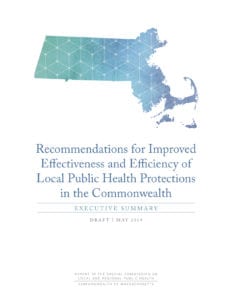Who is a member?
Our members are the local governments of Massachusetts and their elected and appointed leadership.
 The Special Commission on Local and Regional Public Health released an executive summary of its report and recommendations on May 7 during an event at the State House hosted by Rep. Hannah Kane and Sen. Jason Lewis.
The Special Commission on Local and Regional Public Health released an executive summary of its report and recommendations on May 7 during an event at the State House hosted by Rep. Hannah Kane and Sen. Jason Lewis.
The 25-member commission, created by the Legislature in August 2016, was asked to “assess the effectiveness and efficiency of municipal and regional public health systems and to make recommendations regarding how to strengthen the delivery of public health services and preventive measures.”
Dr. Monica Bharel, commissioner of the Massachusetts Department of Public Health and chair of the special commission, said, “Studies over the past two decades document significant differences across cities and towns in the quality, depth and breadth of public health protections.”
The report points out that Massachusetts is unique in the country in that it has a board of health for each of its 351 cities and towns “and a long, proud history of home rule.”
The local boards of health “are often bare bones and the sole responsibility of individual cities and towns, with no dedicated state funding. Their ever-expanding duties are determined by a patchwork of state laws and regulations in addition to local ordinances and bylaws.”
According to the report, local public health systems can help improve health, build a stronger Massachusetts, and reduce health care costs.
The commission makes six recommendations and provides a detailed roadmap for organizing and supporting local health departments to raise standards, strengthen collaboration, better use technology, improve skills, and stabilize resources. The recommendations are intended to be adopted as an interlocking set to support systematic change.
The recommendations are:
• Elevate the standards for and improve the performance of local public health departments.
• Increase cross-jurisdictional sharing of public health services to strengthen the service delivery capabilities of local public health departments, take advantage of economies of scale, and coordinate planning.
• Improve state and local public health departments’ planning and system accountability.
• Set education and training standards for local public health officials and staff, and expand access to professional development.
• Commit appropriate resources for the local public health system changes that are proposed by the commission.
• Continue to engage stakeholders as partners in the process; ensure that relevant state entities have appropriate authority; and explore administrative actions that the Department of Public Health and Department of Environmental Protection can take that support the recommendations.
Reps. Kane and Denise Garlick and Sen. Lewis have filed legislation (H. 1935/S. 1294) aiming to advance the goals identified by the special commission. The legislation would ensure that all members of the local public health workforce have access to essential training, create an incentive grant program to support more effective and efficient delivery of services, and direct the special commission to determine and assess a foundational standard for local public health services in Massachusetts.
The commission’s full draft report is available at www.mass.gov/lists/special-commission-on-local-and-regional-public-health-news-reports.
Local public health stakeholders and others were invited to comment on the findings and recommendations during a two-week comment period. The Special Commission on Local and Regional Public Health is scheduled to meet in late June for a final review of the report, and the approved report is due to be submitted to the governor and Legislature in July.